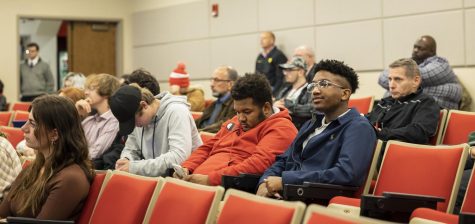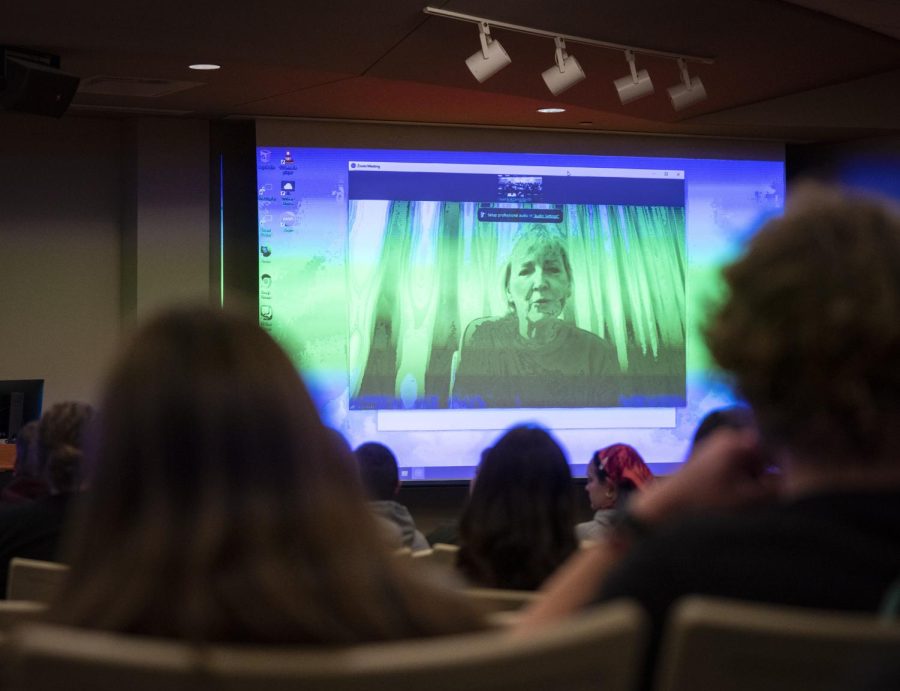‘Fire in the belly’: Two journalists covering Ukraine awarded for courageous international reporting
Students sit in the auditorium in Gary Ransdell Hall to hear from Carol Guzy about her work covering the war in Ukraine on Monday, Nov. 14, 2022. Guzy, along with Olga Rudenko, was awarded the 2022 Fleischaker/Greene Award for Courageous International Reporting.
November 15, 2022
Carol Guzy uses her camera to photograph tragedy, but also hope.
Guzy, along with Olga Rudenko and the team from the Kyiv Independent, are the two latest recipients of the Fleischaker/Greene Awards for Courageous International Reporting for their work in Ukraine. Guzy has worked in Ukraine photographing the impacts of the Russia-Ukraine war on civilians.
WKU’s School of Media hosted an awards celebration on Nov. 14. in Gary Ransdell Hall with an opportunity for students to ask Guzy questions about her work. Guzy greeted students through a Zoom screen from late-night hours in Ukraine. Rudenko and her team were unable to attend.
In 2008, Louisville attorneys Jon Fleischaker and Kim Greene created the Fleischaker/Greene Fund for Excellence in First Amendment Issues at WKU. The award recognizes a journalist who works under dangerous circumstances to protect freedom of speech and leads efforts to better understand populations that are underreported.
“During our years of law practice, each of us separately fell in love with the First Amendment, the importance of which we are seeing in real time as we battle to maintain our democracy,” Greene said. “We have the privilege and honor of working with a lot of good journalists […] but we noticed that we began to share something really important. And that was the passion for the work. The passion for getting the news out and accurate and making sure the public was informed about what our governments are up to […] I like to call that particular passion, the fire in the belly.”
Guzy’s career as a photographer spans more than 40 years, from a staff member at the Miami Herald to The Washington Post and currently as a contract photographer for Zuma Press. Guzy photographed Hurricane Katrina in 2008, international stories in Berlin Germany in 1989, Goma, Zaire in 1999 and more, according to a video by YahooNews played at the event.
“I was lucky to meet Carol in 1988 after she had just started working for The Washington Post,” Jeanie Adams-Smith, photojournalism professor, said. “Her work seemed perfect to me – every moment published a work of tragic art.”

Guzy shared she feels the civilians she’s photographed in Ukraine have welcomed her to tell their stories.
“I always work with a fixer, a translator. I feel like you have to be able to communicate. There’s a lot you can do just with body language and you always have to move beyond the camera,” Guzy said. “I think when you’re photographing someone that they trust what you’re doing. But here in Ukraine, it’s been amazing how people open their arms and their lives and their hearts to us, and our cameras to tell their stories and take their pictures.”
One audience member asked her what moment in her coverage of Ukraine stands out the most.
“I did a whole series on babushka, as I call it ‘Ladies that Stayed,’ and they’re elderly that either couldn’t or mostly wouldn’t leave,” she replied. “They live in bunkers [and] basically potential targets and they are so warm and enchanting and delightful and they’re everyone’s grandmother and mother.”
When the U.S. Military sent troops to Haiti in 1994 to intervene with a military coup, Guzy covered the mission. Her coverage led her to her second Pulitzer Prize.
“I covered Haiti for decades actually,” she said. “It became almost like my second home. I almost moved to Haiti at a certain point. It’s probably one of the most intense places I’ve ever been. The brutality is just beyond description.”
Haiti has also experienced a number of extreme earthquakes. The earthquake in 2010 has left severe damage that people are still recovering from, despite several natural disasters happening since.
“Haiti is a revolving door of turmoil, it still is unfortunately,” Guzy said. “Not only political anarchy [but] natural disasters, I mean to cover the earthquake, the latest one and the one in 2010. They just keep getting slammed.”
Even with Guzy’s courageous career as a photojournalist, she shared one of her biggest regrets is not balancing her career better with her personal life.
“I used to jump from one story to the other,” Guzy said. “I was just so all consumed with, you know, with storytelling, with being a photojournalist, and I didn’t take enough time for my family, and who eventually passed and I think that’s, that’s probably the one thing I would I would change, is to focus a little more on my personal life, too.”
Guzy uses her camera to tell the tragic stories, but she believes that empathy is the key to telling a story.
“I don’t think you can be a journalist without having a dose of empathy,” Guzy said. “I have an overdose of it. Unfortunately, it’s just a blessing and a curse. I don’t understand how I could not be empathetic, because I just feel everything everyone else is feeling. Unfortunately, it breaks my heart probably a million times harder.”
Co-Editor-in-Chief Debra Murray can be reached at [email protected]. Follow her on Twitter @debramurrayy.













